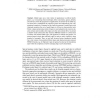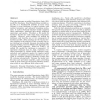224 search results - page 7 / 45 » Structural Operational Semantics and Modal Logic, Revisited |
120
click to vote
KI
2008
Springer
15 years 1 months ago
2008
Springer
Abstract. Modal logics see a wide variety of applications in artificial intelligence, e.g. in reasoning about knowledge, belief, uncertainty, agency, defaults, and relevance. From ...
132
click to vote
EUROCAST
2007
Springer
15 years 5 months ago
2007
Springer
In this paper we introduce an extension of Equilibrium Logic (a logical characterisation of the Answer Set Semantics for logic programs) consisting in the inclusion of modal tempor...
125
click to vote
AIML
2004
15 years 3 months ago
2004
The family of normal propositional modal logic systems are given a highly systematic organisation by their model theory. This model theory is generally given using Kripkean frame s...
113
Voted
INFORMATICALT
2007
15 years 1 months ago
2007
In this paper we consider branching time temporal logics of knowledge and belief. These logics involve the discrete time linear temporal logic operators “next” and “until” ...
118
click to vote
ER
2007
Springer
15 years 5 months ago
2007
Springer
The paper presents an unified Description Logic (DL) model for databases. Describing database models using DLs is a fundamental problem in many areas because it turns databases to...


